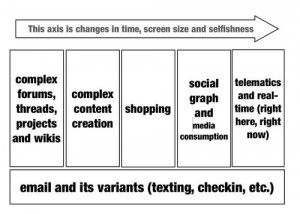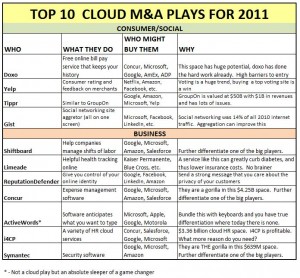
It might be about the size of the screen and whether or not you're standing up.
Start at the bottom. For the first five years of the Internet, the most used function was email. Email remains a bedrock of every device and system that's been built on top of the internet, though sometimes it looks like a text message or a mobile check in. This is the layer for asynchronous person to person connection, over time.
Moving from left to right, we see how the way we use the thing we call the internet has evolved over time. We also see how devices and technology and bandwidth have changed the uses of the net and, interestingly, how a growth in mass has led to a growth in self-motivated behavior.
Early online projects were things like Archie and Veronica and checking in changes to the Linux code base. You needed patience, a big screen and a sense of contribution.
Layer on top of this a practice that is getting ever more professional, which is creating content for others to consume. Sometimes in groups, sometimes using sophisticated software and talented cohorts.

As we move to the right (and through time) we see the birth of online shopping. Still to this day, most online shopping happens on traditional devices, often sitting down.
The sitting down part is not a silly aside. Ted Leonsis theorized twenty years ago that the giant difference between TV and the internet was how far you sat from the screen. TV was an 8 foot activity, and you were a consumer. The internet was a 16 inch activity, and you participated. I think the sitting down thing is similar. You're not going to buy an armoir while standing on the subway.
Moving over in time and device and intent, we see the idea of consuming content. While tablets get their share of shopping, this is where they really shine. I think 2011 is going to be the year of the tablet, from the Kindle to the iPad to the thing we used to call a phone.
It's in the last two categories that these other devices, things that don't involve sitting down, are superior, not just a mobile substitute. The social graph is a very low bandwidth, peripheral attention interaction, perfect for this audience and this medium. And the last category–tell me where I am, where to eat, who's near me, what's the weather, get me a cab right now–is all about me and now and here.
I don't believe this is a winner take all situation, any more than one bestselling book makes all other books obsolete. I think different pillars work for different devices, and there will continue to be winners in all of them.







